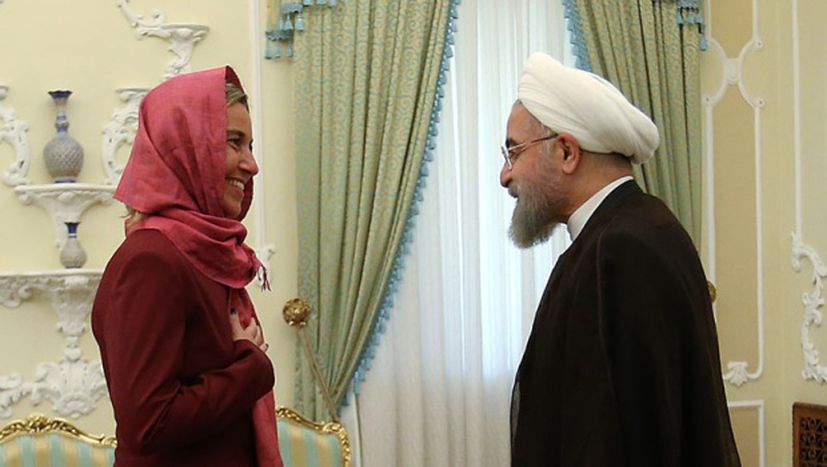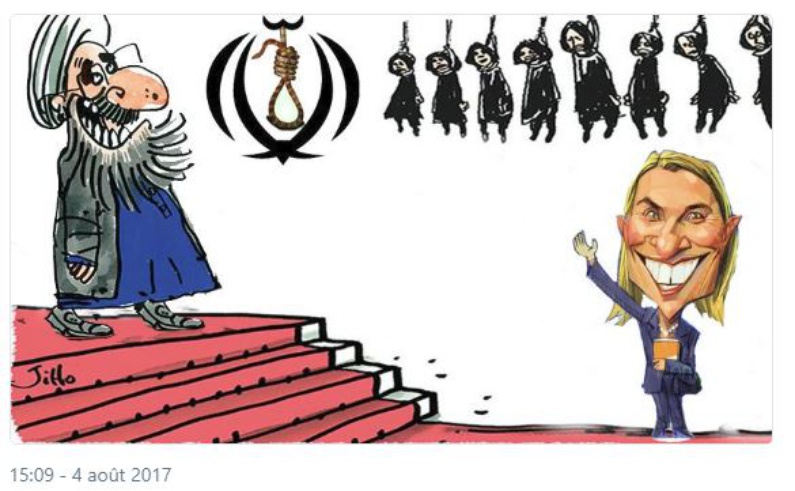
Federica Mogherini shouldn't go to Iran
Published on
Translation by:
Boryana IvanovaThe High Representative of the European Union for Foreign Affairs, Federica Mogherini, is going to Teheran on August 5th in order to take part in the inauguration ceremony for the second term of the President of Iran, Hassan Rohani.
 Such a visit would only encourage the mullahs to continue to exploit the Iranian population, with the blessing of the EU. This visit, when at least 101 executions have taken place in Iran in the month of July 2017 alone, is an insult to the universal values of human rights which the EU considers to protect. It will only engrave in the minds of Iranians the idea that Europe is forsaking its principles.
Such a visit would only encourage the mullahs to continue to exploit the Iranian population, with the blessing of the EU. This visit, when at least 101 executions have taken place in Iran in the month of July 2017 alone, is an insult to the universal values of human rights which the EU considers to protect. It will only engrave in the minds of Iranians the idea that Europe is forsaking its principles.
Rohani hasn't done anything practical so as to improve the situation of human rights in the country. His empty promises of moderation haven't made any impact on peoples' lives who are enduring one of the most repressive regimes in the world since 1979. In the homeland security department, he shares the same opinions as the Supreme Leader, Ali Khamenei. The representatives of the two factions of the regime, the self-proclaimed moderates and the radicals, are both haunted by the prospect of a popular uprising like the one that happened in Iran in 2009.
Rohani's role, just like Khamenei's, is to preserve the foundations of the regime and to ward off its collapse. But what the Iranian people ask for, after 37 years of a brutal and incompetent Islamic regime that put the country on the verge of economic and social disaster, is the change of regime.
Rohani's staff members have played a major role in the war, repression and export of terrorism and fundamentalism. In his first government, the Minister of Justice, Mostafa Pour-Mohammadi, was one of the main culprits for the massacre of 30 000 political prisoners in 1988. A crime that constitutes a "crime against humanity" according to the NGOs.
Throughout Rohani's term, the repression of political opponents and human rights activists, workers, women, scholars, lawyers, journalists and bloggers has intensified.
In its recent report dating from August 2, 2017, Amnesty International exposes the devastating human rights situation in Iran. "The Iranian authorities have led a 'vicious' repression against human rights advocates since Hassan Rohani became President, demonizing and imprisoning the activists who dare defend individual rights".
Amnesty urges the EU to firmly reject the persecution of human rights activists in the country and places emphasis on the fact that " the EU shouldn't stay silent on the outrageous treatment that's reserved for human rights activists in Iran... Instead of being complacent with the Iranian authorities, the EU should strongly demand the immediate and unconditional liberation of all those who have been imprisoned because of their peaceful human rights activism and the end to the misuse of the judicial system that makes activists stay quiet".
Investing in one of the regime's factions only reinforces the Supreme Leader's regime in general and gives him a legitimacy that he doesn't deserve. No change can be envisioned in Iran without the end of the executions, the tortures, as well as the interference of the pasdaran (the Islamic Revolutionary Guard Corps) in Syria, Iraq and Yemen and the end to their nuclear and ballistic projects.
All interaction with the Iranian regime has to be subject to the stays of executions and the improvement of the human rights situation. That's the will of the Iranian people and a necessity for peace and tranquillity in the region and in the world.
265 MEPs condemn the violations of human rights in Iran, June 2017.
Translated from Federica Mogherini ne doit pas se rendre en Iran



